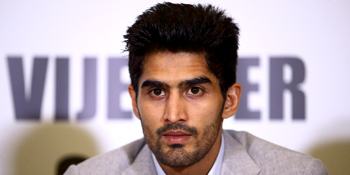New Delhi, Jun 2: The International Boxing Association (AIBA) might have allowed professional boxers to compete in the Olympics but India's biggest pro star Vijender Singh will not be seen in the Rio de Janeiro Games as he hasn't been left with any time or chance to make the cut.

The decision has, however, been met with a mixed response with some like Mike Tyson and Lennox Lewis calling it "foolish" and "preposterous" while others like Amir Khan welcoming the step.
In India, AIBA's decision brought the focus on Olympic medallist Vijender, who turned professional last year. The 30-year-old, a former amateur world No.1 in middleweight, is enjoying an unbeaten run in his pro career and is scheduled to fight for the WBO Asia title belt on July 16 in the national capital.
"I welcome AIBA's decision of allowing professional boxers to compete in the Rio Olympics. I am yet to receive the formalities for this entire process. Since there is no federation in the country, I don't know who will guide me for this entire thing. Right now I am concentrating on my 16 July title fight to be held in New Delhi," Vijender said when asked whether he would give Olympic qualification a shot.
His measured response to the world body's decision is not without ground given that the final Olympic qualifier for the Indians will be the AIBA World Qualifiers in Azerbaijan, starting June 16. The Rio Games are scheduled to start on August 5.
The team for that event has already been finalised and since Vijender was not a part of the trials held last month, he is not in the reckoning to make the cut.
The strapping six-footer is already preparing for his next pro bout which leaves him with no time to pursue an Olympic berth at this stage.
The AIBA's move is already being considered a case of too late for the upcoming Olympics and is likely to show major results, if any, in the 2020 Games in Tokyo.





Comments
Add new comment